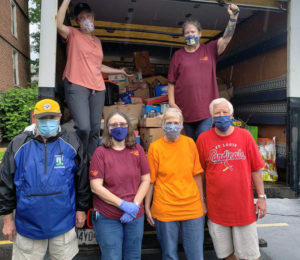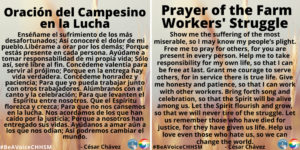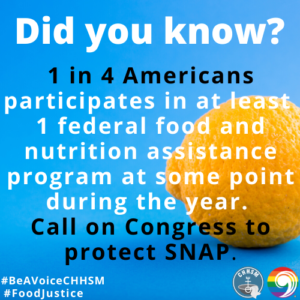Food Insecurity is July Focus of ‘Be A Voice Advocacy Toolkit’

Isaiah 58 Ministries is one of many CHHSM members working to alleviate food insecurity in its local community.
Social injustices are becoming more obvious and recognizable during this time of the coronavirus pandemic, and CHHSM’s faith-based health and human service ministries are continuing and strengthening their outreach in their local communities. One main area of focus is food insecurity, the topic of the July installment of the Be A Voice Health and Human Services Advocacy Toolkit.
A project of the UCC’s Council for Health and Human Service Ministries and Justice and Witness Ministries Washington, D.C., office, the toolkit provides personal stories of CHHSM members, UCC-related and general historical and current context, helpful questions to ask candidates running for office, plus social media graphics and web resources links.
Today, more than 38 million people in the United States live in poverty. Because of the pandemic, some 54 million people — including 18 million children — will likely experience food insecurity in 2020. Isaiah 58 Ministries in St. Louis and United Caring Services in Evansville, Ind., are two of the many CHHSM agencies working to stem the tide of hunger.
Every month, Isaiah 58 Ministries provides food to individuals and families in need. “The people who receive food assistance from us would not be able to put food on the table throughout the month without our help,” says the Rev. Brenda Booth, executive director. “While many receive SNAP (Supplemental Nutrition Assistance Program) aid, very seldom is it enough to provide nutrient-rich food for the entire month.”
Other clients receive no SNAP benefits and would go hungry without Isaiah 58 Ministries. “We make the difference between whether a child goes to bed hungry at night, or with a full tummy,” Booth adds. Isaiah 58 Ministries also provides clothing and school supplies, utility assistance, and educational programs. Thanks to its partnership with CHHSM member Deaconess Nurse Ministry, Isaiah 58 Ministries provide some health care services to its clients as well.

Two of the social media graphics in this month’s toolkit installment.
The U.S. Department of Agriculture defines Food Security as access at all times to enough food for an active, healthy life, and the availability of nutritional, culturally-appropriate, and safe foods and the ability to acquire food without resorting to emergency food supplies, scavenging, or stealing food. Food insecure families may be forced to skip meals, are unable to afford balanced meals, and are often worried that their food will run out before they can afford to buy more.
Prior to the pandemic, one in five persons in the United States experienced hunger; and now, that number is higher. A contributing factor, as outlined in the toolkit, is the inaccessibility of healthy food due to such factors as limited grocery store hours and reduced public transportation schedules.
The toolkit explains how often food insecurity intersects with such justice issues as environmental racism, homelessness, access to health care, and poverty. United Caring Services sees such interactions during its day-to-day operations. It is the only low-barrier, drop-in shelter in Evansville that provides three meals a day, seven days a week, to men, women, children, and families who are experiencing homelessness, who are housing insecure, and/or are experiencing hunger.
 “While food insecurity may be thought of as not enough food to eat, or the access to food at reasonable prices, the impact of food insecurity is much greater,” says Jason Emmerson, executive director of United Caring Services. “Worrying about food can strain relationships and impact a person’s physical and mental health. Food insecurity can be an issue of money — unemployment or underemployment — and is linked to other forms of insecurity like housing, transportation and health. Supporting households in becoming more food secure by considering these other factors will help people become more confident, safer, happier, and successful.”
“While food insecurity may be thought of as not enough food to eat, or the access to food at reasonable prices, the impact of food insecurity is much greater,” says Jason Emmerson, executive director of United Caring Services. “Worrying about food can strain relationships and impact a person’s physical and mental health. Food insecurity can be an issue of money — unemployment or underemployment — and is linked to other forms of insecurity like housing, transportation and health. Supporting households in becoming more food secure by considering these other factors will help people become more confident, safer, happier, and successful.”
Guests who utilize United Caring Services night shelters, and tenants in its apartments, are thankful to have access to meals, showers, restrooms, laundry, a place to belong, and other supportive services all in one place every day, all day, Emmerson adds.
The essential, faith-based outreach provided by Isaiah 58 Ministries, United Caring Services and many other CHHSM members is important. But charities and food banks are unable to shoulder the entire burden of meeting the hunger needs in U.S. communities. The toolkit advocates for an increase in SNAP benefits as well as a reduction in the barriers that prevent military families and others from qualifying for benefits. As the toolkit cites, providing SNAP benefits — or “food stamps” as many people know them by — not only helps recipients purchase food and extend their grocery budget, it helps fuel economic activity: everyone in the supply chain benefits, from farmers to grocery clerks to people who help transport food.
In addition to links providing information on food insecurity and its intersection with other justice issues, the toolkit provides COVID-19 and CHHSM member-related links to help users learn more and find resources.
Join Our Mailing LIst
"*" indicates required fields
Follow on Facebook
Cedar Community and the West Bend Theatre Company Announce Partnership - CHHSM
www.chhsm.org
Cedar Community in West Bend, Wis., and the West Bend Theatre Company (WBTC) announce recently that they will continue their partnership in the 2025 season. Following a highly successful run of Char...